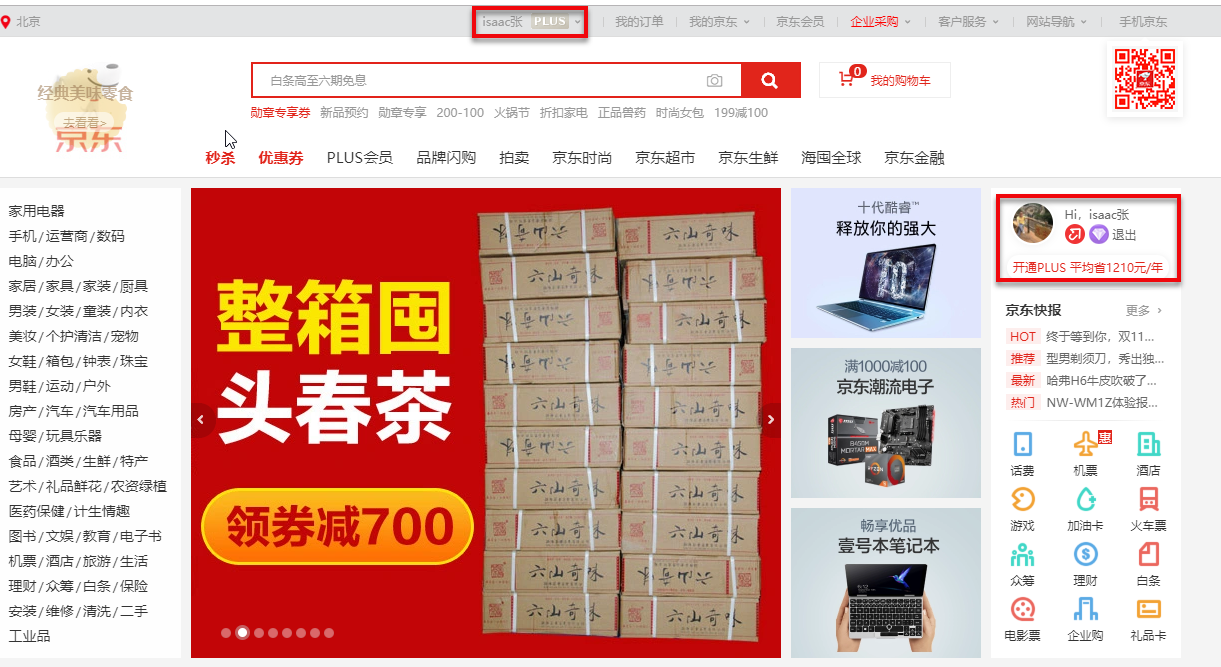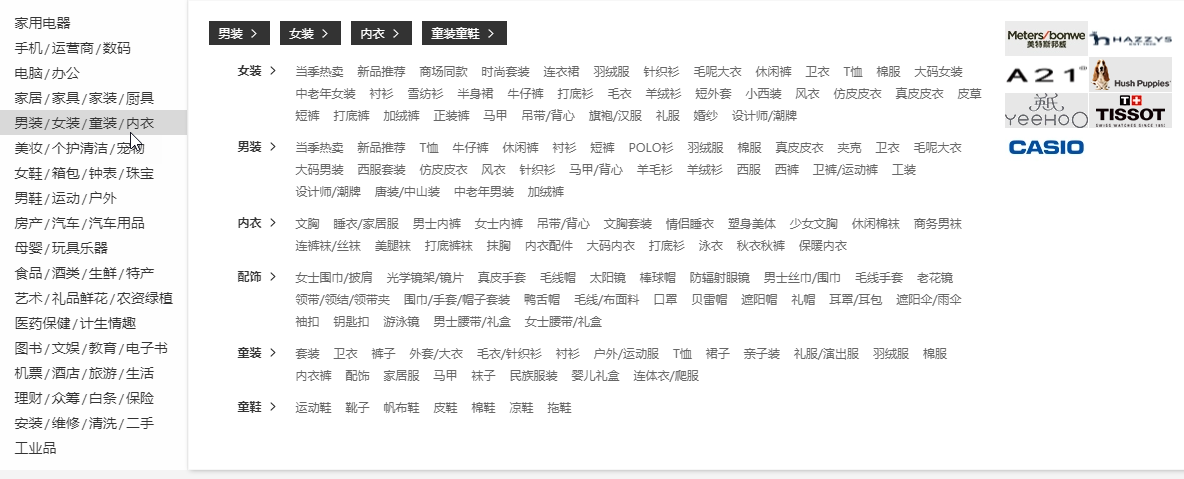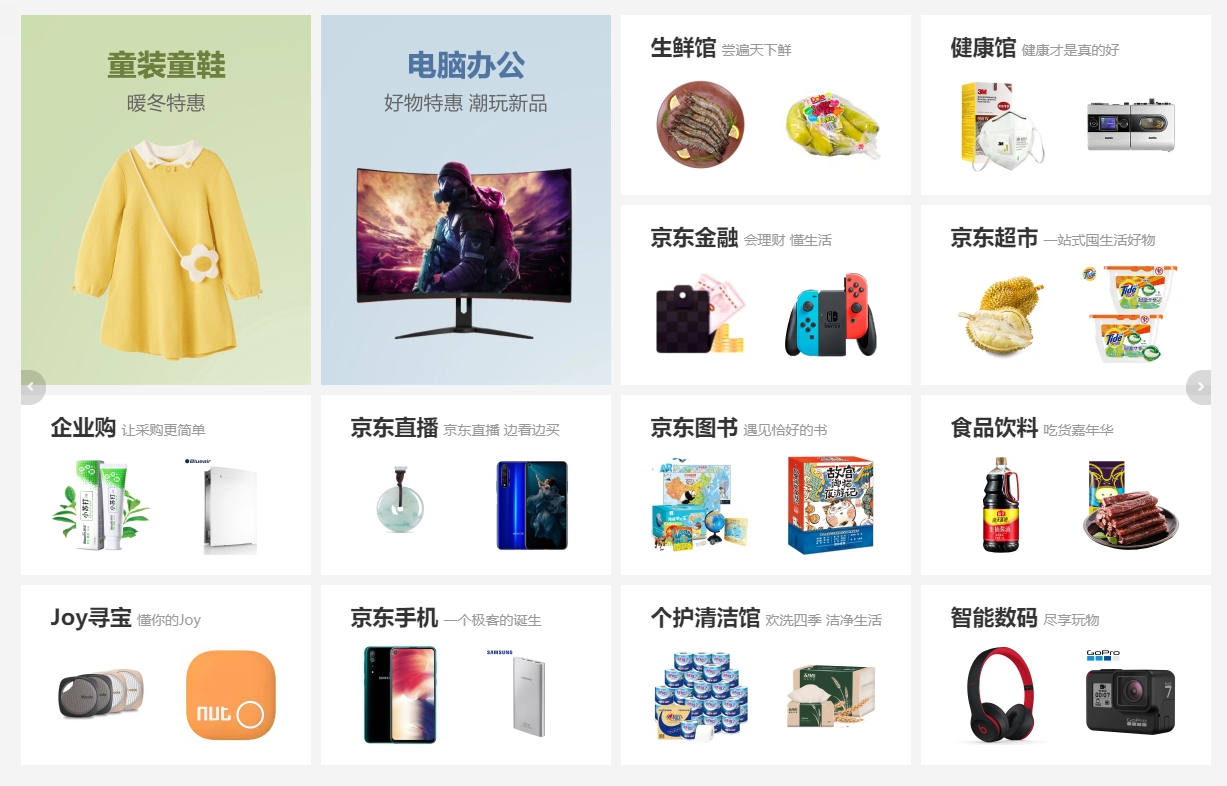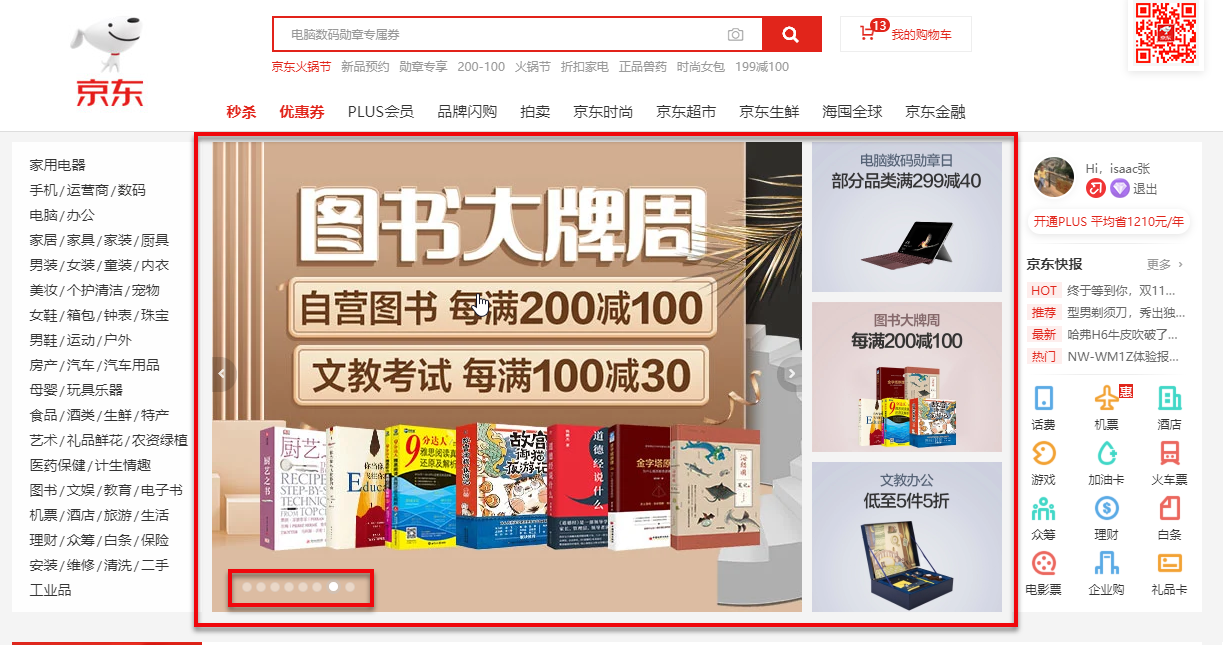商品分类&轮播广告
因最近又被困在了OSGI技术POC,更新进度有点慢,希望大家不要怪罪哦。
上节 我们实现了登录之后前端的展示,如:

接着,我们来实现左侧分类栏目的功能。
| ## 商品分类 | ProductCategory |
|---|
从上图我们可以看出,商品的分类其实是有层级关系的,而且这种关系一般都是无限层级。在我们的实现中,为了效果的展示,我们仅仅是展示3级分类,在大多数的中小型电商系统中,三级分类完全足够应对SKU的分类。
需求分析
---
先来分析分类都包含哪些元素,以jd为例:
- logo(logo) 有的分类文字前面会有小标
- 分类展示主图(img_url)
- 主标题(title)
- 副标题/Slogan
- 图片跳转地址(imglinkurl)-- 大多数时候我们点击分类都会
分类Id跳转到固定的分类商品列表展示页面,但是在一些特殊的场景,比如我们要做一个活动,希望可以点击某一个分类的主图直接定位到活动页面,这个url就可以使用了。 - 上级分类(parent_id)
- 背景色(bg_color)
- 顺序(sort)
- 当前分类级别(type)
开发梳理
---
在上一小节,我们简单分析了一下要实现商品分类的一些points,那么我们最好在每次拿到需求【开发之前】,对需求进行拆解,然后分解开发流程,这样可以保证我们更好的理解需求,以及在开发之前发现一部分不合理的需求,并且如果需求设计不合理的话,开发人员完全有权,也有责任告知PM。大家的终极目的都是为了我们做的产品更加合理,好用,受欢迎!
- 首次展示,仅仅读取一级分类(Root)
- 根据一级分类查询二三级子分类
编码实现
---
查询一级分类
Service实现
1.在com.liferunner.service中创建service 接口ICategoryService.java, 编写查询所有一级分类的方法getAllRootCategorys,如下:
package com.liferunner.service;
import com.liferunner.dto.CategoryResponseDTO;
import com.liferunner.dto.SecondSubCategoryResponseDTO;
import java.util.List;
/**
* ICategoryService for : 分类service
*
* @author <a href="mailto:magicianisaac@gmail.com">Isaac.Zhang | 若初</a>
* @since 2019/11/13
*/
public interface ICategoryService {
/**
* 获取所有有效的一级分类(根节点)
*
* @return
*/
List<CategoryResponseDTO> getAllRootCategorys();
}2.编写实现类com.liferunner.service.ICategoryService.java
@Service
@Slf4j
public class CategorySericeImpl implements ICategoryService {
@Autowired
private CategoryMapper categoryMapper;
@Override
public List<CategoryResponseDTO> getAllRootCategorys() {
Example example = new Example(Category.class);
val conditions = example.createCriteria();
conditions.andEqualTo("type", CategoryTypeEnum.ROOT.type);
val categoryList = this.categoryMapper.selectByExample(example);
//声明返回对象
List<CategoryResponseDTO> categoryResponseDTOS = new ArrayList<>();
if (!CollectionUtils.isEmpty(categoryList)) {
//赋值
CategoryResponseDTO dto;
for (Category category : categoryList) {
dto = new CategoryResponseDTO();
BeanUtils.copyProperties(category, dto);
categoryResponseDTOS.add(dto);
}
}
return categoryResponseDTOS;
}
}上述代码很好理解,创建tk.mybatis.mapper.entity.Example,将条件传入,然后使用通用Mapper查询到type=1的一级分类,接着将查到的对象列表转换为DTO对象列表。
Controller实现
一般情况下,此类查询都会出现在网站的首页,因此我们来创建一个com.liferunner.api.controller.IndexController,并对外暴露一个查询一级分类的接口:
package com.liferunner.api.controller;
import com.liferunner.service.ICategoryService;
import com.liferunner.service.IProductService;
import com.liferunner.service.ISlideAdService;
import com.liferunner.utils.JsonResponse;
import io.swagger.annotations.Api;
import io.swagger.annotations.ApiOperation;
import io.swagger.annotations.ApiParam;
import java.util.Collections;
import lombok.extern.slf4j.Slf4j;
import lombok.val;
import org.springframework.beans.factory.annotation.Autowired;
import org.springframework.util.CollectionUtils;
import org.springframework.web.bind.annotation.GetMapping;
import org.springframework.web.bind.annotation.PathVariable;
import org.springframework.web.bind.annotation.RequestMapping;
import org.springframework.web.bind.annotation.RequestMethod;
import org.springframework.web.bind.annotation.RestController;
/**
* IndexController for : 首页controller
*
* @author <a href="mailto:magicianisaac@gmail.com">Isaac.Zhang | 若初</a>
* @since 2019/11/12
*/
@RestController
@RequestMapping("/index")
@Api(value = "首页信息controller", tags = "首页信息接口API")
@Slf4j
public class IndexController {
@Autowired
private ICategoryService categoryService;
@GetMapping("/rootCategorys")
@ApiOperation(value = "查询一级分类", notes = "查询一级分类")
public JsonResponse findAllRootCategorys() {
log.info("============查询一级分类==============");
val categoryResponseDTOS = this.categoryService.getAllRootCategorys();
if (CollectionUtils.isEmpty(categoryResponseDTOS)) {
log.info("============未查询到任何分类==============");
return JsonResponse.ok(Collections.EMPTY_LIST);
}
log.info("============一级分类查询result:{}==============", categoryResponseDTOS);
return JsonResponse.ok(categoryResponseDTOS);
}
}Test API
编写完成之后,我们需要对我们的代码进行测试验证,还是通过使用RestService插件来实现,当然,大家也可以通过Postman来测试。
{
"status": 200,
"message": "OK",
"data": [
{
"id": 1,
"name": "烟酒",
"type": 1,
"parentId": 0,
"logo": "img/cake.png",
"slogan": "吸烟受害健康",
"catImage": "http://www.life-runner.com/shop/category/cake.png",
"bgColor": "#fe7a65"
},
{
"id": 2,
"name": "服装",
"type": 1,
"parentId": 0,
"logo": "img/cookies.png",
"slogan": "我选择我喜欢",
"catImage": "http://www.life-runner.com/shop/category/cookies.png",
"bgColor": "#f59cec"
},
{
"id": 3,
"name": "鞋帽",
"type": 1,
"parentId": 0,
"logo": "img/meat.png",
"slogan": "飞一般的感觉",
"catImage": "http://www.life-runner.com/shop/category/meat.png",
"bgColor": "#b474fe"
}
],
"ok": true
}根据一级分类查询子分类
因为根据一级id查询子分类的时候,我们是在同一张表中做自连接查询,因此,通用mapper已经不适合我们的使用,因此我们需要自定义mapper来实现我们的需求。
自定义Mybatis Mapper实现
在之前的编码中,我们都是使用的插件帮我们实现的通用Mapper,但是这种查询只能处理简单的单表CRUD,一旦我们需要SQL 包含一部分逻辑处理的时候,那就必须得自己来编写了,let's code.1.在项目mscx-shop-mapper中,创建一个新的custom package,在该目录下创建自定义mappercom.liferunner.custom.CategoryCustomMapper。
public interface CategoryCustomMapper {
List<SecondSubCategoryResponseDTO> getSubCategorys(Integer parentId);
}2.resources目录下创建目录mapper.custom,以及创建和上面的接口相同名称的XML文件mapper/custom/CategoryCustomMapper.xml
<?xml version="1.0" encoding="UTF-8"?>
<!DOCTYPE mapper PUBLIC "-//mybatis.org//DTD Mapper 3.0//EN" "http://mybatis.org/dtd/mybatis-3-mapper.dtd">
<mapper namespace="com.liferunner.custom.CategoryCustomMapper">
<resultMap id="subCategoryDTO" type="com.liferunner.dto.SecondSubCategoryResponseDTO">
<id column="id" jdbcType="INTEGER" property="id"/>
<result column="name" jdbcType="VARCHAR" property="name"/>
<result column="type" jdbcType="INTEGER" property="type"/>
<result column="parentId" jdbcType="INTEGER" property="parentId"/>
<collection property="thirdSubCategoryResponseDTOList" ofType="com.liferunner.dto.ThirdSubCategoryResponseDTO">
<id column="subId" jdbcType="INTEGER" property="subId"/>
<result column="subName" jdbcType="VARCHAR" property="subName"/>
<result column="subType" jdbcType="INTEGER" property="subType"/>
<result column="subParentId" jdbcType="INTEGER" property="subParentId"/>
</collection>
</resultMap>
<select id="getSubCategorys" resultMap="subCategoryDTO" parameterType="INTEGER">
SELECT p.id as id,p.`name` as `name`,p.`type` as `type`,p.father_id as parentId,
c.id as subId,c.`name` as subName,c.`type` as subType,c.parent_id as subParentId
FROM category p
LEFT JOIN category c
ON p.id = c.parent_id
WHERE p.parent_id = ${parentId};
</select>
</mapper>TIPS
上述创建的package,一定要在项目的启动类
com.liferunner.api.ApiApplication中修改@MapperScan(basePackages = { "com.liferunner.mapper", "com.liferunner.custom"}),如果不把我们的custompackage加上,会造成扫描不到而报错。
在上面的xml中,我们定义了两个DTO对象,分别用来处理二级和三级分类的DTO,实现如下:
@Data
@ToString
public class SecondSubCategoryResponseDTO {
/**
* 主键
*/
private Integer id;
/**
* 分类名称
*/
private String name;
/**
* 分类类型
1:一级大分类
2:二级分类
3:三级小分类
*/
private Integer type;
/**
* 父id
*/
private Integer parentId;
List<ThirdSubCategoryResponseDTO> thirdSubCategoryResponseDTOList;
}
---
@Data
@ToString
public class ThirdSubCategoryResponseDTO {
/**
* 主键
*/
private Integer subId;
/**
* 分类名称
*/
private String subName;
/**
* 分类类型
1:一级大分类
2:二级分类
3:三级小分类
*/
private Integer subType;
/**
* 父id
*/
private Integer subParentId;
}Service实现
编写完自定义mapper之后,我们就可以继续编写service了,在com.liferunner.service.ICategoryService中新增一个方法:getAllSubCategorys(parentId).如下:
public interface ICategoryService {
...
/**
* 根据一级分类获取子分类
*
* @param parentId 一级分类id
* @return 子分类list
*/
List<SecondSubCategoryResponseDTO> getAllSubCategorys(Integer parentId);
}在com.liferunner.service.impl.CategorySericeImpl实现上述方法:
@Service
@Slf4j
public class CategorySericeImpl implements ICategoryService {
@Autowired
private CategoryMapper categoryMapper;
@Autowired
private CategoryCustomMapper categoryCustomMapper;
...
@Override
@Transactional(propagation = Propagation.SUPPORTS)
public List<SecondSubCategoryResponseDTO> getAllSubCategorys(Integer parentId) {
return this.categoryCustomMapper.getSubCategorys(parentId);
}
}Controller实现
@RestController
@RequestMapping("/index")
@Api(value = "首页信息controller", tags = "首页信息接口API")
@Slf4j
public class IndexController {
@Autowired
private ICategoryService categoryService;
...
@GetMapping("/subCategorys/{parentId}")
@ApiOperation(value = "查询子分类", notes = "根据一级分类id查询子分类")
public JsonResponse findAllSubCategorys(
@ApiParam(name = "parentId", value = "一级分类id", required = true)
@PathVariable Integer parentId) {
log.info("============查询id = {}的子分类==============", parentId);
val categoryResponseDTOS = this.categoryService.getAllSubCategorys(parentId);
if (CollectionUtils.isEmpty(categoryResponseDTOS)) {
log.info("============未查询到任何分类==============");
return JsonResponse.ok(Collections.EMPTY_LIST);
}
log.info("============子分类查询result:{}==============", categoryResponseDTOS);
return JsonResponse.ok(categoryResponseDTOS);
}
}Test API
{
"status": 200,
"message": "OK",
"data": [
{
"id": 11,
"name": "国产",
"type": 2,
"parentId": 1,
"thirdSubCategoryResponseDTOList": [
{
"subId": 37,
"subName": "中华",
"subType": 3,
"subParentId": 11
},
{
"subId": 38,
"subName": "冬虫夏草",
"subType": 3,
"subParentId": 11
},
{
"subId": 39,
"subName": "南京",
"subType": 3,
"subParentId": 11
},
{
"subId": 40,
"subName": "云烟",
"subType": 3,
"subParentId": 11
}
]
},
{
"id": 12,
"name": "外烟",
"type": 2,
"parentId": 1,
"thirdSubCategoryResponseDTOList": [
{
"subId": 44,
"subName": "XXXXX",
"subType": 3,
"subParentId": 12
},
{
"subId": 45,
"subName": "RRRRR",
"subType": 3,
"subParentId": 12
}
]
}
],
"ok": true
}以上我们就已经实现了和jd类似的商品分类的功能实现。
| ## 轮播广告 | SlideAD |
|---|
需求分析
这个就是jd或者tb首先的最顶部的广告图片是一样的,每隔1秒自动切换图片。接下来我们分析一下轮播图中都包含哪些信息:
- 图片(img_url)是最基本的
- 图片跳转连接(imglinkurl),这个是在我们点击这个图片的时候需要跳转到的页面
- 有的可以直接跳转到商品详情页面
- 有的可以直接跳转到某一分类商品列表页面
- 轮播图的播放顺序(sort)
- ...
开发梳理
直接查询出所有的有效的轮播图片,并且进行排序。
编码实现
Service 实现
和商品分类实现一样,在mscx-shop-service中创建com.liferunner.service.ISlideAdService并实现,代码如下:
public interface ISlideAdService {
/**
* 查询所有可用广告并排序
* @param isShow
* @return
*/
List<SlideAdResponseDTO> findAll(Integer isShow, String sortRanking);
}@Service
@Slf4j
public class SlideAdServiceImpl implements ISlideAdService {
// 注入mapper
private final SlideAdsMapper slideAdsMapper;
@Autowired
public SlideAdServiceImpl(SlideAdsMapper slideAdsMapper) {
this.slideAdsMapper = slideAdsMapper;
}
@Override
public List<SlideAdResponseDTO> findAll(Integer isShow, String sortRanking) {
Example example = new Example(SlideAds.class);
//设置排序
if (StringUtils.isBlank(sortRanking)) {
example.orderBy("sort").asc();
} else {
example.orderBy("sort").desc();
}
val conditions = example.createCriteria();
conditions.andEqualTo("isShow", isShow);
val slideAdsList = this.slideAdsMapper.selectByExample(example);
//声明返回对象
List<SlideAdResponseDTO> slideAdResponseDTOList = new ArrayList<>();
if (!CollectionUtils.isEmpty(slideAdsList)) {
//赋值
SlideAdResponseDTO dto;
for (SlideAds slideAds : slideAdsList) {
dto = new SlideAdResponseDTO();
BeanUtils.copyProperties(slideAds, dto);
slideAdResponseDTOList.add(dto);
}
}
return slideAdResponseDTOList;
}
}从上述可以看到,这里我使用的是构造函数注入SlideAdsMapper,其余代码单表查询没什么特别的,根据条件查询轮播图,并返回结果,返回的对象是com.liferunner.dto.SlideAdResponseDTO列表,代码如下:
@Data
@AllArgsConstructor
@NoArgsConstructor
@Builder
@ApiModel(value = "轮播广告返回DTO", description = "轮播广告返回DTO")
public class SlideAdResponseDTO{
/**
* 主键
*/
private String id;
/**
* 图片地址
*/
private String imageUrl;
/**
* 背景颜色
*/
private String backgroundColor;
/**
* 商品id
*/
private String productId;
/**
* 商品分类id
*/
private String catId;
/**
* 图片跳转URL
*/
private String imageLinkUrl;
/**
* 轮播图类型 用于判断,可以根据商品id或者分类进行页面跳转,1:商品 2:分类 3:链接url
*/
private Integer type;
/**
* 轮播图展示顺序 轮播图展示顺序,从小到大
*/
private Integer sort;
/**
* 是否展示 是否展示,1:展示 0:不展示
*/
private Integer isShow;
/**
* 创建时间 创建时间
*/
private Date createTime;
/**
* 更新时间 更新
*/
private Date updateTime;
}Controller实现
在com.liferunner.api.controller.IndexController中,新添加一个查询轮播图API,代码如下:
@Autowired
private ISlideAdService slideAdService;
@GetMapping("/slideAds")
@ApiOperation(value = "查询轮播广告", notes = "查询轮播广告接口")
public JsonResponse findAllSlideList() {
log.info("============查询所有轮播广告,isShow={},sortRanking={}=============="
, 1, "desc");
val slideAdsList = this.slideAdService.findAll(1, "desc");
if (CollectionUtils.isEmpty(slideAdsList)) {
log.info("============未查询到任何轮播广告==============");
return JsonResponse.ok(Collections.EMPTY_LIST);
}
log.info("============轮播广告查询result:{}=============="
, slideAdsList);
return JsonResponse.ok(slideAdsList);
}Test API
{
"status": 200,
"message": "OK",
"data": [
{
"id": "slide-100002",
"imageUrl": "http://www.life-runner.com/2019/11/CpoxxF0ZmH6AeuRrAAEZviPhyQ0768.png",
"backgroundColor": "#55be59",
"productId": "",
"catId": "133",
"type": 2,
"sort": 2,
"isShow": 1,
"createTime": "2019-10-11T21:33:01.000+0000",
"updateTime": "2019-10-11T21:33:02.000+0000"
},
{
"id": "slide-100003",
"imageUrl": "http://www.life-runner.com/2019/11/CpoxxF0ZmHuAPlXvAAFe-H5_-Nw961.png",
"backgroundColor": "#ff9801",
"productId": "y200008",
"catId": "",
"type": 1,
"sort": 1,
"isShow": 1,
"createTime": "2019-10-11T21:33:01.000+0000",
"updateTime": "2019-10-11T21:33:02.000+0000"
}
],
"ok": true
}福利讲解
在我们的实现代码中,有心的同学可以看到,我使用了3种不同的Bean注入方式:
- 属性注入
@Autowired
private ISlideAdService slideAdService;- 构造函数注入
// 注入mapper
private final SlideAdsMapper slideAdsMapper;
@Autowired
public SlideAdServiceImpl(SlideAdsMapper slideAdsMapper) {
this.slideAdsMapper = slideAdsMapper;
}- Lombok插件注入(本质也是构造器注入,代码会动态生成。)
@RequiredArgsConstructor(onConstructor = @__(@Autowired))
public class ProductServiceImpl implements IProductService {
// RequiredArgsConstructor 构造器注入
private final ProductCustomMapper productCustomMapper;
private final ProductsMapper productsMapper;
...
}那么,这几种注入都有什么区别呢?首先我们下了解一下Spring的注入是干什么的?
Spring提出了依赖注入的思想,即依赖类不由程序员实例化,而是通过Spring容器帮我们new指定实例并且将实例注入到需要该对象的类中。
依赖注入的另一种说法是"控制反转"。通俗的理解是:平常我们new一个实例,这个实例的控制权是我们程序员, 而控制反转是指new实例工作不由我们程序员来做而是交给Spring容器来做。
在传统的SpringMVC中,大家使用的都是XML注入,比如:
<!--配置bean,配置后该类由spring管理-->
<bean name="CategorySericeImpl" class="com.liferunner.service.impl.CategorySericeImpl">
<!--注入配置当前类中相应的属性-->
<property name="categoryMapper" ref="categoryMapper"></property>
</bean>
<bean name="categoryMapper" class="com.liferunner.mapper.CategoryMapper"></bean>注入之后,使用@Autowired,我们可以很方便的自动从IOC容器中查找属性,并返回。
@Autowired的原理
在启动spring IoC时,容器自动装载了一个
AutowiredAnnotationBeanPostProcessor后置处理器,当容器扫描到@Autowied、@Resource或@Inject时,就会在IoC容器自动查找需要的bean,并装配给该对象的属性。注意事项:
在使用@Autowired时,首先在容器中查询对应类型的bean
如果查询结果刚好为一个,就将该bean装配给@Autowired指定的数据
如果查询的结果不止一个,那么@Autowired会根据名称来查找。
如果查询的结果为空,那么会抛出异常。解决方法时,使用required=false
上述三种注解方式,其实本质上还是注入的2种:set属性注入 & 构造器注入,使用方式都可以,根据个人喜好来用,本人喜欢使用lombok插件注入是因为,它将代码整合在一起,更加符合我们Spring自动注入的规范。
源码下载
---
下节预告
---
下一节我们将继续开发我们电商的核心部分-商品列表和详情展示,在过程中使用到的任何开发组件,我都会通过专门的一节来进行介绍的,兄弟们末慌!
gogogo!
奔跑的人生 | 博客园 | segmentfault | spring4all | csdn | 掘金 | OSChina | 简书 | 头条 | 知乎 | 51CTO